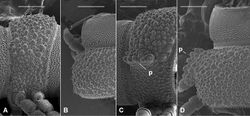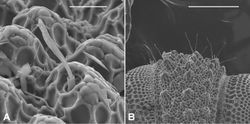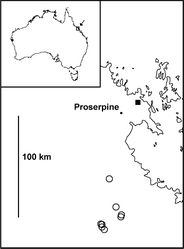Agathodesmus bucculentus
| Notice: | This page is derived from the original publication listed below, whose author(s) should always be credited. Further contributors may edit and improve the content of this page and, consequently, need to be credited as well (see page history). Any assessment of factual correctness requires a careful review of the original article as well as of subsequent contributions.
If you are uncertain whether your planned contribution is correct or not, we suggest that you use the associated discussion page instead of editing the page directly. This page should be cited as follows (rationale):
Citation formats to copy and paste
BibTeX: @article{Mesibov2013ZooKeys325, RIS/ Endnote: TY - JOUR Wikipedia/ Citizendium: <ref name="Mesibov2013ZooKeys325">{{Citation See also the citation download page at the journal. |
Ordo: Polydesmida
Familia: Haplodesmidae
Genus: Agathodesmus
Name
Agathodesmus bucculentus (Jeekel, 1986) – Wikispecies link – Pensoft Profile
Note
This species was described from three specimens collected by Dr and Mrs Jeekel in 1980, under logs in rainforest along the 'Broken Hill' [probably 'Broken River'] track in Eungella National Park (Jeekel 1986[1]). Another 183 specimens from the same general area are in Australian collections (see below), and the Agathodesmus bucculentus range in central coastal Queensland is now known to have a north-south extent of ca 50 km (Fig. 12).
Material examined
ANIC: 35 males, 17 females, 1 stadium 7 female, Eungella National Park, Qld, 21°09'S, 148°30'E ±1 km, 760 m a.s.l., 10 November 1976, R.W. Taylor and T.A. Weir, ANIC berlesate 562, rainforest, 64-000332; 16 males, same details but ANIC berlesate 563, 64-000329; 27 males, same details but ANIC berlesate 564, 64-000333; 4 males, Finch Hatton Gorge, Qld, 21°05'S, 148°38'E ±1 km, 200 m a.s.l., 11 November 1976, R.W. same collectors, ANIC berlesate 565, rainforest, 64-000334; 6 males, 4 females, 2 stadium 7 males, 5 stadium 7 females, Broken River, Eungella National Park, Qld, 21°10'S, 148°31'E ±1 km, 700 m a.s.l., 10-12 November 1976, same collectors, ANIC berlesate 559, rainforest, 64-000331; 3 males, 1 female, same details but ANIC berlesate 560, 64-000330; 17 males, 1 female, 1 stadium 7 female, same details but ANIC berlesate 561, 64-000335; 7 males, 1 female, 1 stadium 7 female, same details but ANIC berlesate 568, 64-000328; 18 males, 2 females, same details but ANIC berlesate 570, 64-000336. QM: 1 male, 2 females, Mt William, Eungella National Park, Qld, 21°01'05"S, 148°35'57"E ±500 m, 1240 m a.s.l., 19 April 1979, G. Monteith, QM berlesate 41, rainforest, sieved litter, S96025; 2 males, 1 stadium 7 female, Eungella, Qld, schoolhouse, 21°07'51"S, 148°29'32"E ±2 km, 13 February 1986, J. Gallon and R. Raven, QM berlesate 709, rainforest, S96026; 1 male, Finch Hatton Gorge, Qld, 21°04'13"S, 148°38'11"E ±500 m, 300 m a.s.l., 18 November 1992, G. Monteith, G. Thompson, D. Cook and H. Janetzki, S96027; 3 males, 4 females, Mt Macartney, Qld, 20°49'57"S, 148°33'07"E ±500 m, 950 m a.s.l., 19 November 1992, same collectors, S96028.
Remarks
There is little to add to the excellent description and illustrations of Jeekel (1986)[1], except to confirm that the short metatergal setae noted by Jeekel are bipartite with slightly flared tips (Fig. 4A) as in most other Agathodesmus, and that the dp in Agathodesmus bucculentus is indeed 'complicated'. Fig. 16 in Jeekel (1986)[1] clearly shows the meb: it is divided near its base into a curving, needle-like medial process and a more or less parallel, broader, distally expanded and lamellar lateral process. However, the meb in Agathodesmus bucculentus is not 'on caudal side' (Jeekel 1986[1], p. 49), but lies between the mab and the pp, as in other Agathodesmus spp.
Taxon Treatment
- Mesibov, R; 2013: New species of Agathodesmus Silvestri, 1910 from Australia (Diplopoda, Polydesmida, Haplodesmidae) ZooKeys, 325: 33-64. doi
Other References
- ↑ 1.0 1.1 1.2 1.3 Jeekel C (1986) Millipedes from Australia, 10: Three interesting new species and a new genus (Diplopoda: Sphaerotheriida, Spirobolida, Polydesmida). Beaufortia 36(3): 35-50.
Images
|


